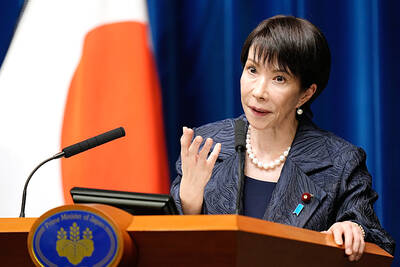The Civil Aeronautics Administration (CAA) finalized the distribution of regular cross-strait flights yesterday, with close to half of the flights granted to the nation’s two largest airlines.
While the agency reserved 15 flights per week for financially strapped Far Eastern Air Transport (FAT), it will let other airlines share these flights until FAT resumes operations.
Civil Aeronautics Administration Director-General Lee Lung-wen (李龍文) said his agency was still reviewing FAT’s application to resume business.
FAT has secured a district court’s approval to restructure its finances and has scheduled a stakeholders meeting later this month.
“The company may not acquire the funding it needs to restructure its finances if it is denied the right to operate cross-strait flights, so we decided to reserve 15 flights for it,” Lee said.
“But before FAT has functional and safe aircraft to provide cross-strait flights, each of the five other airlines will get three additional flights,” Lee said. “When FAT has sufficient aircraft, the other five airlines will gradually hand back these flights to it.”
Even if FAT resumes operations, it cannot apply to fly to a specific city in China, Lee said. It can only use the number of flights reserved for it and fly to cities that no other airline wants to service.
The CAA also completed the distribution of 135 weekly cross-strait flights. The number of flights was determined at the third-round of cross-strait talks in April.
China Airlines and EVA Air will provide 30 flights per week, including those from FAT’s portion. UNI Air and Mandarin Airlines will each have 25 flights and TransAsia Airways will have 24.
One weekly flight from Taichung to Shengchun will be offered, with UNI and Mandarin taking turns offering the flight in three-month segments.
While cross-strait talks agreed that flights could be offered to 27 Chinese cities, the airlines are only interested in 19. Shanghai is the most popular destination, with 28 flights a week departing from either Taiwan Taoyuan International Airport or Taipei Songshan Airport.

The Ministry of Foreign Affairs (MOFA) yesterday voiced dissatisfaction with the Comprehensive and Progressive Agreement for Trans- Pacific Partnership (CPTPP), whose latest meeting, concluded earlier the same day, appeared not to address the country’s application. In a statement, MOFA said the CPTPP commission had "once again failed to fairly process Taiwan’s application," attributing the inaction to the bloc’s "succumbing to political pressure," without elaborating. Taiwan submitted its CPTPP application under the name "Separate Customs Territory of Taiwan, Penghu, Kinmen and Matsu" on Sept. 22, 2021 -- less than a week after China

THE GOOD WORD: More than 100 colleges on both sides of the Pacific will work together to bring students to Taiwan so they can learn Mandarin where it is spoken A total of 102 universities from Taiwan and the US are collaborating in a push to promote Taiwan as the first-choice place to learn Mandarin, with seven Mandarin learning centers stood up in the US to train and support teachers, the Foundation for International Cooperation in Higher Education of Taiwan (FICHET) said. At the annual convention of the American Council on the Teaching of Foreign Languages held over the weekend in New Orleans, Louisiana, a Taiwan Pavilion was jointly run by 17 representative teams from the FICHET, the Overseas Community Affairs Council, the Steering Committee for the Test of Proficiency-Huayu, the

A home-style restaurant opened by a Taiwanese woman in Quezon City in Metro Manila has been featured in the first-ever Michelin Guide honoring exceptional restaurants in the Philippines. The restaurant, Fong Wei Wu (豐味屋), was one of 74 eateries to receive a “Michelin Selected” honor in the guide, while one restaurant received two Michelin stars, eight received one star and 25 were awarded a “Bib Gourmand.” The guide, which was limited to restaurants in Metro Manila and Cebu, was published on Oct. 30. In an interview, Feng Wei Wu’s owner and chef, Linda, said that as a restaurateur in her 60s, receiving an

MORE RETALIATION: China would adopt a long-term pressure strategy to prevent other countries or future prime ministers following in Sanae Takaichi’s steps, an academic said Taiwan should maintain communications with Japan, as Japanese Prime Minister Sanae Takaichi is to lead a revision of security documents, Taiwanese academics said yesterday. Tensions have risen between Japan and China over remarks by Takaichi earlier this month that the use of force against Taiwan would constitute a “survival-threatening situation” for Japan. Prospect Foundation president Lai I-chung (賴怡忠) yesterday said Takaichi’s stance regarding Taiwan is the same as past Japanese prime ministers, but her position is clearer than that of her predecessors Fumio Kishida and Shigeru Ishiba. Although Japan views a “Taiwan contingency” as a “survival-threatening situation,” which would allow its military to